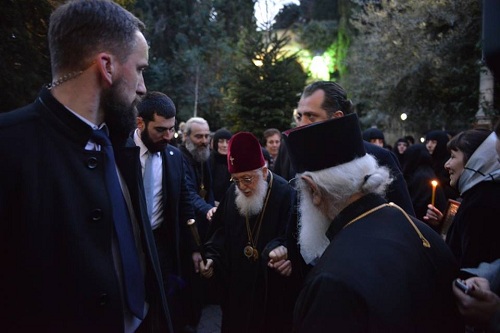| Patriarch Returns amid Questions on Alleged Murder Plot |
| Civil Georgia, Tbilisi / 21 Feb.'17 / 15:43 |

Illia II at the Residence of the Georgian Orthodox Church, February 20, 2017. Photo: Parliament of Georgia
Illia II, Patriarch of Georgia’s Orthodox Church, returned to Georgia on February 20, a week after the arrest of Archpriest Giorgi Mamaladze, who purportedly intended to carry sodium cyanide, a poisonous chemical substance, to Germany, where the Patriarch was undergoing medical treatment.
In his brief media commentary at the airport, surrounded by the Orthodox parish, Illia II thanked “the German people and Germany, professors, who did everything [they could] to end the surgery well.”
He also touched upon the “unpleasant” and “unfortunate” developments over Archpriest Giorgi Mamaladze and stated that the Patriarchate will “study the case together with the Government and make conclusions.”
“I am sure everything will end peacefully and well,” he added before heading to his residence, where he received senior clerics and state officials throughout the day, including President Giorgi Margvelashvili and Parliamentary Chairman Irakli Kobakhidze.
The Patriarch’s return comes amid lingering questions on the alleged murder plot.
The prosecutors and the Government have remained silent on the matter since their initial statement, waiting, as the two explained, for the Patriarch’s return.
Prime Minister Giorgi Kvirikashvili, who spoke with Imedi TV on February 18, said that the Government is “refraining” from disclosing the materials, for the purpose of maintaining the public’s trust towards the Church, “the most important institute for [Georgia’s] statehood,” and its integrity.
The Government’s decision not to disclose the materials, Kvirikashvili said, was met with “unjust and inadequate reactions” from the society and the Church.
“We did not want to worry the Patriarch before the surgery and refrained from publicizing the information on the arrest. Unfortunately, this was not how one of the media stations acted [referring to Rustavi 2 TV], which published the information [first] and we were forced to act in the role of a respondent,” Kvirikashvili explained.
“I hope that when the Patriarch returns to Georgia and is informed completely, he will have a relevant position on the matter,” Kvirikashvili added.
PM Kvirikashvili also touched upon the criticism of the opposition over the ambiguity of the Chief Prosecutor’s initial statement.
“When someone is arrested with such a substance and he is travelling to the Patriarch, we cannot but permit all possible scenarios. Therefore, we issued a statement and took relevant preventive measures to avoid a big tragedy,” Kvirikashvili said.
Mamaladze’s lawyers, who are bound by the prosecutor-imposed non-disclosure agreement, have been unable to speak on the content of the investigation, hence, unable to voice the position of the arrested.
The restriction has been heavily criticized by the Public Defender and several human rights organizations, including the Georgian Young Lawyers Association, the Human Rights Center and the Tolerance and Diversity Institute.
Mikheil Ramishvili, Mamaladze’s new lawyer, who, unlike his other lawyers, refuses to sign the non-disclosure agreement, stated on February 20 that the prosecutors have filed a charge against the Archpriest over the murder plot involving Shorena Tetruashvili, the Patriarch’s assistant. Tetruashvili, who is not a cleric, is seen as a powerful personality in the Patriarch’s inner circle.
Lawyer Irma Chkadua, who, as reported by media, is one of the witnesses in the case and whom another witness and Archpriest Giorgi Mamaladze’s acquaintance Irakli Mamaladze addressed for legal assistance, when he allegedly learned the Archpriest’s intentions, said that the audio and video materials that Irakli Mamaladze showed her “are very difficult to watch and listen to.”
“The only suggestion that I had [to Irakli Mamaladze], was that he should have definitely appealed to the police, otherwise he would be an accomplice to or he would cover up the preparation of this grave crime,” Chkadua stated on February 20.
She also said that “two more persons” participated in the conversation, but refrained from naming them.
The Prosecutor’s Office has not commented on either of the statements.
